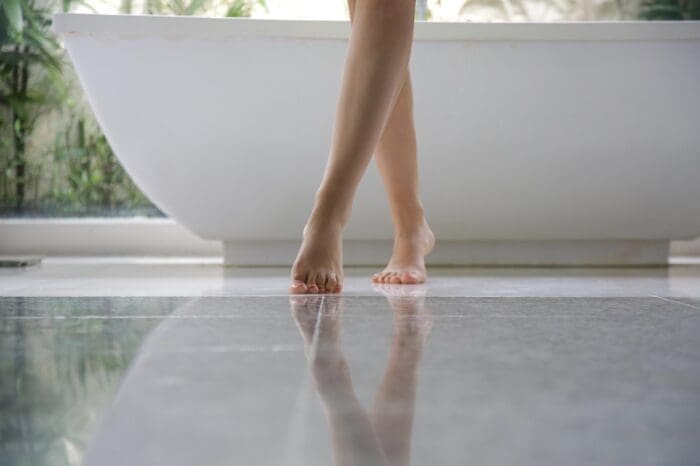While remodeling your bathroom’s vanities and cabinets, you could also upgrade your outdated or loose flooring. Your bathroom plays an important role in your home, so you’ll want your new floors to effectively withstand potential wear and tear.
Choosing an appropriate material for your floor can make your bathroom comfortable, safe, and stylish. Cabinet Discounters is a wholesale manufacturer for bathroom and kitchen hardware. Below we’ll outline how flooring material can affect your bathroom remodeling project.

Exploring the Best Bathroom Flooring Materials
Your bathroom floor needs to be both stylish and practical. It should handle daily moisture, foot traffic, and cleaning without losing its appeal. With so many options available, selecting the right material can feel overwhelming. Below, we break down the best bathroom flooring choices, including their pros, cons, to help you make the best decision for your space.
Porcelain & Ceramic Tile: The Classic Choice
Porcelain and ceramic tiles have long been the go-to flooring material for bathrooms. These materials are completely waterproof, making them ideal for wet environments. Spills, splashes, and humidity won’t damage them, so you won’t have to worry about warping or mold growth.
One of the biggest advantages of tile is its affordability. Compared to natural stone or high-end alternatives, ceramic and porcelain are a budget-friendly way to get a polished look. They also come in endless design options like sleek, modern large-format tiles and intricate mosaic patterns. You can even find tiles that mimic wood, marble, or concrete for a fraction of the cost of the real thing.
However, tile does have a few drawbacks. The grout lines between tiles can trap dirt and need regular cleaning to prevent discoloration. Tile floors can also feel cold underfoot, which might be uncomfortable in colder climates. If that’s a concern, think about installing radiant floor heating beneath the tiles for extra warmth.
Natural Stone: Timeless Luxury
For homeowners who want a high-end, spa-like aesthetic, natural stone flooring delivers unmatched elegance. Materials like marble, slate, travertine, and granite each have unique textures and veining. This ensures no two floors look exactly alike. Stone is also incredibly durable and can last decades with proper care.
Like tile, stone is naturally waterproof, making it suitable for bathrooms. However, it does need more maintenance than other options. Because stone is porous, it needs to be sealed regularly (usually once a year) to prevent stains and water damage. Some varieties, like polished marble, can also be slippery when wet, so opt for a honed or textured finish for better traction.
While stone is undeniably beautiful, it comes with a higher price tag because of materials and installation. It’s also heavier than other flooring types, so your bathroom’s subfloor may need reinforcement to support the weight. If you’re willing to invest in the upkeep, though, stone flooring can elevate your bathroom into a true sanctuary.
Vinyl Flooring: Affordable & Versatile
Vinyl has surged in popularity as a bathroom flooring option, thanks to its affordability, durability, and realistic designs. Modern luxury vinyl plank (LVP) and vinyl tile (LVT) can convincingly mimic wood, stone, or even patterned cement. It does this all while being 100% waterproof.
Vinyl is also soft underfoot, so it provides a warmer and more comfortable surface. It’s also resistant to scratches and dents, making it a great choice for households with kids or pets. Installation is relatively easy. Options ranging from peel-and-stick tiles to click-together floating floors are perfect for DIYers.
The main downside to vinyl is its longevity. Over time, seams may curl, and heavy furniture can leave permanent indentations. Cheaper vinyl can also fade or wear down in high-traffic areas. For the best results, choose a high-quality, thick vinyl with a strong wear layer.
Additional Bathroom Flooring Options to Consider
Engineered Wood: Warmth Without the Risk
If you love the look of hardwood but worry about moisture damage, engineered wood is a smart alternative. Its plywood base resists warping better than solid wood. Many varieties are designed specifically for bathrooms. However, it still needs careful sealing and isn’t as waterproof as tile or vinyl.
Cork: Eco-Friendly & Comfortable
Cork is naturally water-resistant, antimicrobial, and soft underfoot. It’s also a sustainable choice, harvested from renewable cork oak trees. However, it needs frequent sealing to maintain its water resistance and can dent under heavy objects.
Concrete: Industrial & Customizable
Polished or stained concrete creates a modern look and stands up well to moisture. It’s incredibly durable but can feel hard and cold. Adding area rugs or radiant heating can improve comfort.
How to Choose the Right Bathroom Flooring
When you’re picking out bathroom flooring, keep these things in mind:
- Water Resistance: Prioritize fully waterproof materials like tile, vinyl, or stone to prevent damage.
- Durability: High-traffic bathrooms need scratch- and stain-resistant options.
- Comfort: If you dislike cold floors, vinyl or cork may be better than tile or concrete.
- Budget: Tile and vinyl offer great looks at lower prices, while stone and engineered wood are premium investments.
- Maintenance: Some materials need regular sealing, while vinyl is nearly maintenance-free.
Bathroom Flooring, Vanities, and More in Annapolis, MD
The best bathroom flooring depends on your style, budget, and lifestyle. Porcelain and ceramic tiles are classic and budget-friendly, natural stone offers unmatched luxury, and vinyl provides a practical alternative. By weighing the pros and cons of each, you can find a floor that’s both beautiful and built to last.
Cabinet Discounters sells bathroom cabinets, vanities, countertops, and more to customers renovating their homes near Annapolis, MD. Our company can help you with remodeling projects throughout your house, including your kitchen. Visit one of our showrooms, or contact Cabinet Discounters online anytime.
